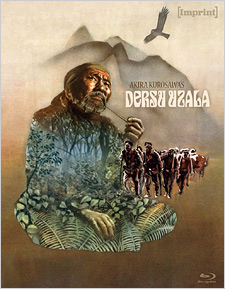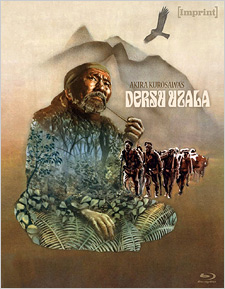Dersu Uzala (Blu-ray Review)

Director
Akira KurosawaRelease Date(s)
1975 (October 7, 2022)Studio(s)
Mosfilm/Daiei Film (Imprint Films/Via Vision)- Film/Program Grade: A
- Video Grade: B
- Audio Grade: B
- Extras Grade: B+
Review
[Editor’s Note: This is an Australian import Blu-ray release but is coded for ALL REGIONS, so it will work on US Blu-ray players.]
Dersu Uzala came together at a critical time in the life of director Akira Kurosawa. In Japan, attitudes towards his work were beginning to shift, such that many Japanese critics and studio executives began to believe that Kurosawa was too “Western” in his filmmaking. This was an absurd and erroneous notion, but the practical result was that Japanese financing for Kurosawa productions simply dried up. Ironically, the West would eventually come to his rescue, with American studios (including Fox, MGM, and Warner Bros.) and filmmakers (George Lucas, Francis Ford Coppola, and Martin Scorsese) helping to fund his last few projects. But in the early 1970s, Kurosawa simply couldn’t get a film produced no matter how hard he struggled.
Complicating matters was the fact that Kurosawa had recently been hired by 20th Century Fox to direct the Japanese portions of Tora! Tora! Tora!, but was eventually fired by the studio for lack of progress. (The conflict resulted from a clash in Kurosawa’s usual production style over the Hollywood norm at the time.) As a result of these difficulties, the director lapsed into an extreme depression and eventually attempted suicide. Kurosawa fortunately survived and, in 1972, was offered the chance to direct a film with Russian financing as a co-production with Mosfilm.
Kurosawa chose for the project to adapt a book by the former Russian Army captain and explorer Vladimir Arseniev (one that Kurosawa had read many years before), about the unlikely bond the captain developed with a wise yet humble Siberian hunter named Dersu Uzala. Back in 1902, Arseniev had been tasked by his superiors to map the Ussuri region of eastern Siberia. On his first expedition to the area, he and his men encountered Dersu in the wilderness. As they shared a meal over the campfire one evening, Dersu quickly revealed his extensive knowledge of the land and spoke of losing his family to smallpox. Knowing that a local guide could prove invaluable to his work, Arseniev asked Dersu to join their expedition. Dersu consented, and through many months of difficult exploring over multiple trips, formed a strong and lifelong connection with the captain and his men.
Shot entirely in Siberia, Kurosawa’s film version of Dersu Uzala tells the powerful story of this journey and friendship. Beautifully acted (by Yury Solomin as Arseniev and Maxim Munzuk as Derzu), handsomely photographed in 70 mm (Kurosawa’s only work in that format, with the help of a trio of cinematographers including Ran’s Asakazu Nakai), and featuring a sparse score by Soviet composer Isaak Shvarts (then best known for White Sun of the Desert—a film that cosmonauts watch by tradition on the eve of spaceflight), Dersu Uzala reveals Kurosawa’s own humanism and his keen awareness of our need to live in better harmony with the natural world.
Sadly, viewing Dersu Uzala in good quality has long presented a frustration to Kurosawa fans. Two DVD versions have been available (one released by Kino in 2000 and another by the RUSCICO, the Russian Cinema Council, in 2001) and neither was particularly good. Meanwhile, more recent Italian and Spanish Blu-ray releases have included no English subtitles. Dersu was shot photochemically in 70 mm (at 2.20:1) using Soviet-made cameras and film stock, specifically “Sovscope 70” film from the Shostka Chemical Plant in Ukraine, an improved formulation of the stock used by Sergei Bondarchuk for War and Peace in 1966-67. Though even this improved stock was of somewhat inconsistent quality, whereas War and Peace has deteriorated badly, the original 70 mm negative for Dersu apparently still exists in good condition. But while Mosfilm has made a noble effort in recent years to restore many of their classic films, and work on a Dersu restoration began in 2016-17, it’s reportedly difficult for them to access and work with the 70 mm. So most Mosfilm restorations have tended to be 2K efforts sourced from 35 mm elements only. (A few 70 mm distribution prints are still in circulation, including one shown in 2009 at the Todd-AO festival in Karlsruhe, Germany—you can see breathtaking screenshots here—but it’s unknown if any actually restoration work has or is being done in greater than 2K resolution from such elements.) In any case, the version of Dersu Uzala currently available for streaming on the Criterion Channel has all the hallmarks of a 2K restoration from 35 mm, and that same source is what’s been used by Imprint Films to master their new Blu-ray edition.
The good news, however, is that the 1080p HD image on Imprint’s Blu-ray edition has plenty of room to breathe and is thus far less compressed, resulting in a modest but notable improvement in overall crispness and fine texturing. This is especially apparently when you compare the Blu-ray to the streaming version on a large display or projection screen. What’s more, the color has been carefully graded to render a more naturally-life like image. Contrasts are deeper, without sacrificing detail, and the highlights are a little bolder too. There are still remaining issues, including uneven color and density, the usual interpositive softness for titles and opticals, the generational loss of detail that results in working from 35 mm elements, the odd bit of gate weave, etc. But speaking personally, while I’ve never had the pleasure of seeing this film projected in actual 70 mm, Imprint’s Blu-ray delivers the best home video image I’ve ever experienced for this film. It’s a far cry better than the previous DVD presentations and I would compare it favorably to Criterion’s recent War and Peace Blu-ray (reviewed here).
The film’s soundtrack is presented in the original Russian in lossless 5.1 DTS-HD Master Audio format, no doubt remastered from the film’s six-track stems, with optional English subtitles. The dialogue is clean and clear at all times, with Shvarts’ score offered in pleasing fidelity. The stage is big, wide, and front-focused, with pleasing bass, while the surrounds are employed for light atmospheric fill—the sounds of the Siberian wilderness abound in bird calls, the whispering wind, and various insect and animal noises. A little analog hiss remains, but on the whole this is a very good mix that supports the visuals well. An English-dubbed 5.1 mix is also included, but so are optional English only subtitles, so the Russian is really the only way to go to properly appreciate this film.
Here’s more good news: Imprint Films has delivered a surprisingly nice batch of supplements for this release, as follows...
- Audio Commentary by Stuart Galbraith IV
- Mapping Kurosawa: A History of Dersu Uzala (HD – 23:16)
- Sound of the Taiga (HD – 17:59)
- Actor Yuri Solomin on Writer Vladimir Arseniev (SD – 3:54)
- Actor Yuri Solomin on Director Akira Kurosawa (SD – 9:04)
- Actor Yuri Solomin Discusses the Film (SD – 6:56)
- Making the Film (SD – 5:02)
- Archive Footage of the Real Vladimir Arseniev (SD – :53)
- US Theatrical Trailer (SD – 2:26)
The features start with a terrific and newly-created commentary by Japanese film historian Stuart Galbraith IV (author of the highly-recommended book The Emperor and the Wolf: The Lives and Films of Akira Kurosawa and Toshiro Mifune), who delivers a steady stream of background information on the film’s origins and production, insights into its director, and more. He’s accompanied by occasional guests, including biologist Jonathan C. Slaght (who has studied the flora and fauna of the region), professor Sergei Glebov (an expert on Russian/Soviet history), and film producer and attorney Barbara Boyle (who represented Roger Corman’s New World Films, which distributed the film in the US). Simply put, the commentary is a treasure trove of context and detail, much of which will be new to even the most avid Kurosawa fan. Imprint has also produced two new documentary featurettes, one with film historian Michael Brooke discussing the film and another with music historian David Schecter on Shvarts’ score. The rest of these extras are carried over from the previous Kino and RUSCICO DVD releases, including interview segments with actor Yuri Solomin, a short Russian look behind-the-scenes at the production, old newsreel footage of the real Arseniev, and the theatrical trailer used by New World Films to promote the US release. Together, this is more material than fans of the film had any right to expect, and every bit of it is welcome.
Kurosawa devotees can always hope that Dersu Uzala one day receives the proper 6K/70 mm restoration it so greatly deserves. Until that day, however, Imprint Films’ new Blu-ray release is a long-awaited and much-needed gift to those same fans. No, its image quality isn’t perfect. But this is far better than the film has ever looked before on a disc with English subtitles, and by a wide margin. Dersu Uzala is a masterpiece of international cinema that’s far too long been overlooked by cinephiles, simply because it’s been hard to experience in decent quality. The film is one of Akira Kurosawa’s finest works... and this Blu-ray is highly recommended.
- Bill Hunt
(You can follow Bill on social media at these links: Twitter and Facebook)

